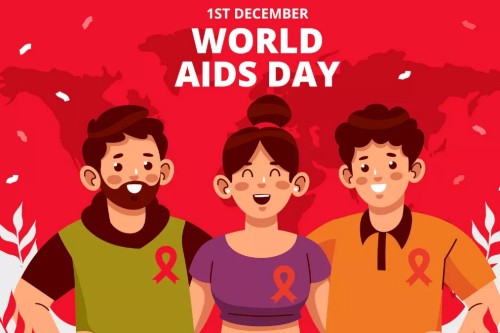
Message by Winnie Byanyima, Executive Director of UNAIDS, on World AIDS Day文章源自英文巴士-https://www.en84.com/13986.html
联合国艾滋病规划署执行主任温妮·拜安伊玛世界艾滋病日致辞文章源自英文巴士-https://www.en84.com/13986.html
文章源自英文巴士-https://www.en84.com/13986.html
December 1, 2022文章源自英文巴士-https://www.en84.com/13986.html
2022年12月1日文章源自英文巴士-https://www.en84.com/13986.html
文章源自英文巴士-https://www.en84.com/13986.html
Friends, greetings from Tanzania on World AIDS Day!文章源自英文巴士-https://www.en84.com/13986.html
文章源自英文巴士-https://www.en84.com/13986.html
朋友们,值此世界艾滋病日,我在坦桑尼亚向大家问好。文章源自英文巴士-https://www.en84.com/13986.html
文章源自英文巴士-https://www.en84.com/13986.html
Today is a moment to honor over 40 million lives lost to AIDS, to take stock of the AIDS response, and to commit to ending AIDS by 2030.
我们要纪念因艾滋病而失去生命的4000多万人,重新分析评估艾滋病应对措施,并致力于2030年终结艾滋病大流行。
This week, we launched a new report. We called it Dangerous Inequalities. In it, we called the world’s attention to a painful reality: currently, we are not on track to end AIDS by 2030, and the reason is inequality.
在今年的世界艾滋病日前夕,联合国艾滋病规划署发布了新报告《危险的不平等》(Dangerous Inequalities)。在报告中,我们呼吁全世界关注当前令人心痛的现实:目前,我们尚未走上2030年结束艾滋病的轨道,究其原因是不平等。
But there’s good news: by equalizing, we can end AIDS.
但有好消息是:通过实现平等,我们可以终结艾滋病。
Firstly, we must equalize for women and girls to reduce their HIV risks.
首先,我们必须使妇女和女童获得平等,以减少她们感染艾滋病病毒的风险。
In sub-Saharan Africa, adolescent girls and young women are three times more likely to be infected with HIV than boys and men of the same age. The driving factor here is inequality.
在撒哈拉以南非洲,青春期女童和年轻女性感染艾滋病病毒的可能性是同龄男童和男性的3倍,造成这种状况的因素是不平等。
Enabling girls to stay in school until they complete secondary education reduces their vulnerability to HIV infection by up to 50%. When we include comprehensive sexuality education and other measures for girls’ empowerment, then their risk is reduced even further. That is why 12 African countries have come together, supported by the African Union in the Education Plus Initiative that is supported by the UN to make this happen.
让女童在学校完成中学教育,可将她们感染艾滋病病毒的可能性降低50%。当我们采取全面性教育和其他增强女童权能的措施时,她们的风险就会进一步降低。因此,12个非洲国家在联合国的支持下共同发起了“教育+”倡议以实现这一目标。
Beyond this, we must combine services for sexual reproductive health together with services for preventing and responding to sexual and gender-based violence and services for HIV.
其次,我们必须将性与生殖健康服务、预防和应对性暴力和基于性别的暴力以及艾滋病服务结合起来。
They must be designed to work for all women and girls in all their diversity.
这些服务都必须提供给所有来自不同背景的妇女和女童。
That way, we equalize for women and girls.
这样,我们才能确保妇女和女童获得平等。
Secondly, we must equalize for marginalized people.
我们必须确保边缘群体获得平等。
Discrimination against marginalized people is hurting the HIV response. Globally, gay men and other men who have sex with men are 28 times more likely to be infected with HIV. People who inject drugs have 35 times the risk, sex workers 30 times the risk, and transgender women 14 times the risk.
对边缘群体的歧视正在阻碍艾滋病防治措施。在全球范围内,男同性恋者和其他男男性行为者感染艾滋病病毒的可能性是其他男性的28倍。注射毒品人员感染艾滋病病毒的风险是其他人群的35倍,性工作者感染艾滋病病毒的风险是其他人群的30倍,跨性别女性感染艾滋病病毒的风险是其他人群的14倍。
We will not end AIDS unless we can end it for everyone.
只有不让任何人掉队,我们才能终结艾滋病。
The evidence is clear: when you decriminalise, people will come forward for services. Decriminalisation saves lives.
事实就摆在眼前:去罪化可以使更多人寻求卫生服务,去罪化可以挽救生命。
Take South Africa, where same-sex relationships are legal. Gay men are 60% more likely to be living with HIV than other men. But in Uganda, where gay men are criminalized, they are 240% more likely to be with HIV than other men.
在同性关系合法的南非,男同性恋感染艾滋病病毒的可能性比其他男性感染艾滋病病毒的高60%。但在男同性恋被定罪的乌干达,男同性恋感染艾滋病病毒比其他男性艾滋病病毒的可能性高240%。
In Asia, in Thailand, where same-sex relationships are legal, gay men are 11 times more likely to living with HIV than other men. But go to Malaysia, where gay men are criminalized, they are 72 times more likely to be living with HIV.
在同性关系同样合法的泰国,男同性恋者感染艾滋病毒的可能性是其他男性的11倍,但在男同性恋被定罪的马来西亚,男同性恋者感染艾滋病病毒可能性是其他男性的72倍。
But here is the good news. There is a growing momentum from Asia to Africa to the Caribbean, for decriminalizing same-sex relationships. In recent years, unlike countries like Angola, Bhutan, and Botswana have decriminalized. In the past few months alone, St. Kitts and Nevis, Singapore, Antigua and Barbuda have decriminalized. In 68 countries, these laws still exist. Let’s consign these harmful and colonial laws to history!
让人欣喜的是——从亚洲到非洲,再到加勒比地区,同性关系去罪化的势头越来越好,比如前几年的安哥拉、不丹和博茨瓦纳,以及前几个月的圣基茨和尼维斯、新加坡、安提瓜和巴布达。仍有68个国家存在上述定罪性的法律。让我们将这些有害的法律丢到历史的垃圾堆。
But we don’t only need to decriminalize; we need to fight stigma.
我们不仅要去罪化,我们还需要与污名作斗争。
Stigma is the sentence passed by society on people for who they are. And stigma kills.
污名是一种社会性的判决,它妨碍人们做自己,足以造成致命的影响。
We need to end stigma for people living with HIV and for marginalized communities. Here, we need every leader to step in – political leaders, faith leaders, traditional leaders, cultural leaders.
Rise!
Equalize!
我们需要结束对艾滋病病毒感染者和被边缘群体的污名化。我们需要每一位领袖——政治领袖、信仰领袖、传统领袖、文化领袖——站起来,实现众人平等。
And thirdly: an inequality that breaks my heart is that against children living with HIV. With the science that we have today, no baby should be born with HIV and no child who has HIV should not be on treatment [should not be without treatment]. But today, while three quarters of adults living with HIV are on treatment, only half of children with HIV are. This is intolerable.
第三,针对儿童艾滋病病毒感染者的不平等令我心碎。
在现今科学的进步下,任何婴儿出生时都不应该感染艾滋病病毒,任何感染艾滋病病毒的儿童都应该能够接受治疗。但今天,尽管四分之三的成年艾滋病病毒感染者正在接受治疗,但只有一半的儿童在接受治疗。这是不能容忍的。
We will not allow this shameful and avoidable injustice to continue. That is why the UN, international partners, civil society and governments from [the] 12 countries with the highest burden have come together and formed the Global Alliance to End AIDS in Children. We are moving! Tanzania, here where I am, will host the official launch early next year.
我们不会允许这种可耻、可避免的不公正继续下去。这就是为什么联合国、国际伙伴、民间社会和12个负担最重的国家的政府联合起来,成立了终结儿童感染艾滋病全球联盟,并将于明年年初在坦桑尼亚正式启动。
Lastly and crucially, to end AIDS, we must tackle the inequalities in resourcing.
最后也是至关重要的,为了终结艾滋病,我们必须解决资源方面的不平等。
COVID-19 and the war in Ukraine have increased inequality worldwide. Every single day, G20 countries receive $136 million in debt repayments from poor countries in the South. Meanwhile, in these countries, debt repayments are four times more than they spend on health; twice what they spend on education. This is an injustice.
新冠肺炎危机和乌克兰战争加剧了全球不平等。每天,20国集团国家都会从南部贫穷国家获得1.36亿美元的债务偿还,相当于这些国家卫生支出的4倍、教育支出的2倍。
In the midst of a crisis of debt, austerity and inequality hitting developing countries, some rich countries have also cut back aid – aid for global health – and are considering even deeper cuts.
在债务危机、财政紧缩和不平等冲击发展中国家的背景下,一些富裕国家削减了对全球卫生的援助,并正在考虑进一步削减。
This is not right. Now is not the time to step away; it is the time to step up.
这是不对的。现在不是抽身而退,而是挺身而出的时候。
Remember: it is through international solidarity that we reduced inequalities in financing and made amazing gains against HIV, including bringing more than 28 million people onto life-saving treatment. We must complete the job.
记住:正是通过国际团结,我们减少了资金的不平等,并在艾滋病防治方面取得了惊人的成就,包括使2800多万人接受了挽救生命的治疗。我们必须完成这项工作。
On World AIDS Day, UNAIDS joins with people living with HIV around the world, communities around the world. And we have one call-to-action, which is: equalize.
在世界艾滋病日,联合国艾滋病规划署与世界各地的艾滋病病毒感染者和社区组织共同呼吁采取行动:实现平等。
Equalize access to rights, equalize access to services, equalize access to resources, equalize access to the best science and medicine.
平等获得权利,平等获得服务,平等获得资源,平等获得最佳科学成果和药物。
This is how we will end AIDS.
这样,我们将终结艾滋病。
Thank you.
谢谢!

